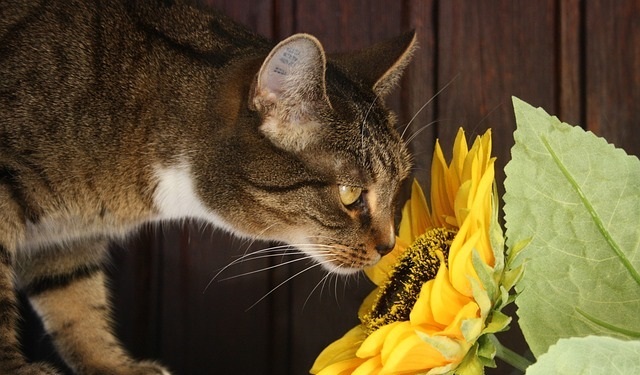
We’ve all heard the good old phrase “curiosity killed the cat” right? Cats are pretty darn curious little fur balls and they’ll often decide to see which of your house plants might taste the best. This could include anything from batting at the leaves to digging up the dirt around the plant to all out chowing down on the plant right in front of you.
While each of these behaviors is rather annoying as a cat owner, the most dangerous thing your cat can do is to ingest parts of poisonous plants. If you haven’t already read my article on which plants are poisonous to cats, you’ll definitely want to head over and check that out. If you’ve already read it and your plants are ‘cat safe’ and you just want them to quit eating then please continue reading. First we’ll look at why cats eat and harass your plants then we’ll answer the age old question of “How to Keep Cats From Eating House Plants!”
Why Does My Cat Eat House Plants?
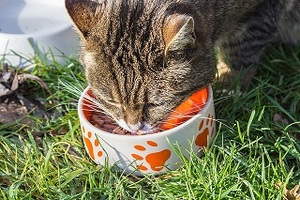 Cats can eat or destroy your house plants for a number of reasons, but the most common reasons have root causes that can be addressed by you as a cat owner. So let’s take a look at those reasons:
Cats can eat or destroy your house plants for a number of reasons, but the most common reasons have root causes that can be addressed by you as a cat owner. So let’s take a look at those reasons:
- Sheer Boredom: When cats get bored they tend to get mischievous. This can result in all sorts of poor behavior, anything from tearing up an entire roll of toilet paper to of course tearing up your house plants. Be sure your cat is getting plenty of exercise and structured play each day.
- Enjoyment: We humans love the taste and smell of plenty of plants. Your cat may have found something they really enjoy and thus just wants to keep eating it. I know when I find something tasty I can hardly resist eating it, especially sweets!
- Dietary Deficiency: Cats instinctively search for nutrients they aren’t getting in their daily diet. While cats don’t depend specifically on plant matter to live, there are certain nutrients like folic acid that they can acquire through eating plants.
- Hairballs / Indigestion: More often than us humans, cats get the need to regurgitate. While this is most often caused by a hairball, it can be caused by something else in their diet too. Eating plants material can will cause a lot of cats to vomit up whatever undesirable item is in their digestive track.
So How Do I Address It?
There are a wide number of things you can do to keep your cat from eating your plants. The first thing I will mention though is that you should not be yelling at your cat when they eat your plants. While that is the first instinct most people have, yelling at your cat typically just makes your cat afraid of you. They don’t make the connection. Instead you should focus on other methods that get your cat to leave your plants alone of their own accord. I’ve listed a set of ideas you can try, in what I consider escalating order of complexity or cost. If the easy stuff doesn’t work, try moving on up the chain.
The Basics:
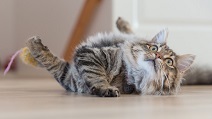 Ensure your cat gets plenty of attention & exercise: Making sure your cat gets a chance to stretch out and play each day is of vital importance for their general health, but it can also ensure that they don’t act out in boredom. Be sure you take time out of your day, every day if possible, to play with your cat. If you’re gone during the day consider getting toys that you can start remotely or that have a timer to auto shut off shortly after you leave.
Ensure your cat gets plenty of attention & exercise: Making sure your cat gets a chance to stretch out and play each day is of vital importance for their general health, but it can also ensure that they don’t act out in boredom. Be sure you take time out of your day, every day if possible, to play with your cat. If you’re gone during the day consider getting toys that you can start remotely or that have a timer to auto shut off shortly after you leave.- Make the nearby area unappealing: Placing double sided tape or aluminum foil on the ground near your plant is a good way to help prevent your cat from coming near it. You’ll have to crinkle the foil up a bit to make it an uneven surface. Most cats don’t like the feeling of these surfaces and might just stay away from that alone.
- Make the Plant Taste/Smell Bad For Your Cat: Your cat’s nose is far more sensitive than your own, so putting something on or near the plant that is unpleasant can make them steer clear. There are a couple of good options available:
- A combination of 25% vinegar and 75% water (don’t use this too often because vinegar is acidic and can damage leaves).
- Sprinkle something with a very strong scent like cayenne pepper around the base of the plant and on some of the leaves.
- Cats dislike the scent of citrus, some orange peels and lemon peels around the base of the plant is another viable option.
Stepping It Up a Notch:
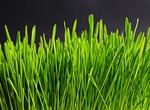
- Provide Edible Alternatives: There are plenty of plants out there your cat can eat, in particular cat grass, cat nip and cat mint. Cat grass in particular is easy enough to grow at home in just a few days. You can use these alternatives to encourage your cat to focus on them instead of your other plants. Note you don’t want to place the edibles right next to your other houseplants, keep them in areas where they won’t register pleasure with eating your other plants.
- Cat Deterrent Systems: You may have heard of the SSSCat System, it is a pretty cool gadget. Essentially it works by detecting your cat nearby with a motion sensor and spraying a jet of compressed air at them. This will typically scare your cat off. I’ll be posting a full review of the SSSCat system shortly, but to say the least it works quite well with my two wimpy cats :).
- Cat Deterrent Sprays: There are a bunch of different sprays out there, but the two biggest are Bitter Lemon and Anti-Chew. Both promise to keep your cat from chewing on things they aren’t supposed to chew on. Be sure you spray them in a small area first before going to town, otherwise you could really damage your plants if they react poorly to the spray.
- Grow Buffer Plants: Adding some buffer plants that cats don’t like can help deter them. By buffer plants I mean place plants like lavender and rosemary nearby the plants your cat is eating. These plants have very strong scents that don’t appeal to cats and can help deter them.
Taking It to the Extreme
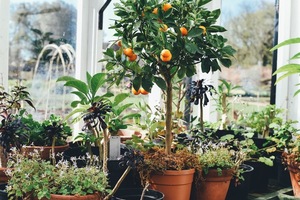 Moth Balls: Moth balls have a very strong scent that cats don’t seem to like, but they are also toxic to cats if ingested. If you can put them inside a safe box with holes popped in it so the scent comes out this is a viable option as well. There’s the unfortunate side effect that most people hate the smell of moth balls too.
Moth Balls: Moth balls have a very strong scent that cats don’t seem to like, but they are also toxic to cats if ingested. If you can put them inside a safe box with holes popped in it so the scent comes out this is a viable option as well. There’s the unfortunate side effect that most people hate the smell of moth balls too.- Lion Dung: Yes folks, lion dung. You can buy lion dung now. It is part of a product called Silent Roar. The idea is if you mix this into the dirt your houseplant is in that cats will realize a far larger and more fierce animal has marked this territory and your cat will now leave it alone. I have not tried this product, but some reviews of it are positive.
- Cage Your Plants: You could use a pre-bought cage or rig something up yourself, but a plant cage could keep the plant safe at the expense of looking pretty tacky and becoming a huge hassle for you to work around.
- Create a Safe Room: If you’re fortunate to have enough space, as a last resort you can move your plants into that room and keep it cat free. This will let your plants grow and keep them safe from your cat.
If all else fails you can always try growing different plants inside to see which ones your cat ignores. Generally cats don’t like plants with very strong scents so this can help you locate a few plants that might work. Whatever you do, be sure the plant is not poisonous to your cat before you decide to grow it nearby.
Wrapping It All Up
Let’s quickly recap everything:
- Your cat could be eating your plants for any reason from boredom to a dietary deficiency
- First and foremost be sure the plant your cat is chewing on isn’t poisonous (if it is get to the vet immediately or get in touch with the ASPCA or PPH)
- Be sure your cat is getting plenty of play time & exercise each day
- Deploy deterrents in escalating levels depending on effectiveness
- Do not yell at your cat as they will instead become afraid of you instead of afraid eating the plant
If you have any experience keeping your cat from eating a particular plant please share it below or email me directly at Craig@StuffCatsWant.com. I’ll be happy to update the article to reflect any additional information!
StuffCatsWant.com is a participant in the Amazon Services LLC Associates Program, an affiliate advertising program designed to provide a means for sites to earn advertising fees by advertising and linking to Amazon.com.
